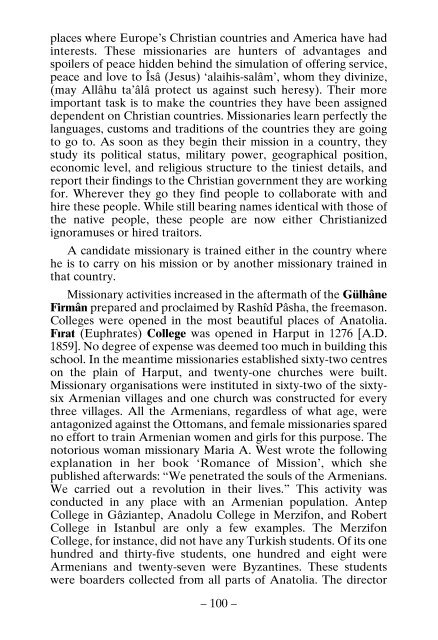Confessions Of A British Spy
Muhammad of Najd was the sort I had been looking for. For his scorn for the time’s scholars, his slighting even the (earliest) four Khalîfas, his having an independent view in understanding the Qur’ân and the Sunna were his most vulnerable points to hunt and obtain him. So different this conceited youngster was from that Ahmed Efendi who had taught me in Istanbul! That scholar, like his predecessors, was reminiscent of a mountain. No power would be able to move him. Whenever he mentioned the name of Abû Hanîfa, he would stand up, go and make an ablution. Whenever he meant to hold the book of Hadîth named he would, again, make an ablution. The Sunnîs trust this book very much. Muhammed of Najd, on the other hand, disdained Abû Hanîfa very much. He would say, “I know better than Abû Hanîfa did. In addition, according to him, half of the book of wrong.
Muhammad of Najd was the sort I had been looking for. For
his scorn for the time’s scholars, his slighting even the (earliest)
four Khalîfas, his having an independent view in understanding
the Qur’ân and the Sunna were his most vulnerable points to hunt
and obtain him. So different this conceited youngster was from
that Ahmed Efendi who had taught me in Istanbul! That scholar,
like his predecessors, was reminiscent of a mountain. No power
would be able to move him. Whenever he mentioned the name of
Abû Hanîfa, he would stand up, go and make an ablution.
Whenever he meant to hold the book of Hadîth named he would, again, make an ablution. The Sunnîs trust this book
very much.
Muhammed of Najd, on the other hand, disdained Abû Hanîfa
very much. He would say, “I know better than Abû Hanîfa did.
In addition, according to him, half of the book of wrong.
You also want an ePaper? Increase the reach of your titles
YUMPU automatically turns print PDFs into web optimized ePapers that Google loves.
places where Europe’s Christian countries and America have had<br />
interests. These missionaries are hunters of advantages and<br />
spoilers of peace hidden behind the simulation of offering service,<br />
peace and love to Îsâ (Jesus) ‘alaihis-salâm’, whom they divinize,<br />
(may Allâhu ta’âlâ protect us against such heresy). Their more<br />
important task is to make the countries they have been assigned<br />
dependent on Christian countries. Missionaries learn perfectly the<br />
languages, customs and traditions of the countries they are going<br />
to go to. As soon as they begin their mission in a country, they<br />
study its political status, military power, geographical position,<br />
economic level, and religious structure to the tiniest details, and<br />
report their findings to the Christian government they are working<br />
for. Wherever they go they find people to collaborate with and<br />
hire these people. While still bearing names identical with those of<br />
the native people, these people are now either Christianized<br />
ignoramuses or hired traitors.<br />
A candidate missionary is trained either in the country where<br />
he is to carry on his mission or by another missionary trained in<br />
that country.<br />
Missionary activities increased in the aftermath of the Gülhâne<br />
Firmân prepared and proclaimed by Rashîd Pâsha, the freemason.<br />
Colleges were opened in the most beautiful places of Anatolia.<br />
Fırat (Euphrates) College was opened in Harput in 1276 [A.D.<br />
1859]. No degree of expense was deemed too much in building this<br />
school. In the meantime missionaries established sixty-two centres<br />
on the plain of Harput, and twenty-one churches were built.<br />
Missionary organisations were instituted in sixty-two of the sixtysix<br />
Armenian villages and one church was constructed for every<br />
three villages. All the Armenians, regardless of what age, were<br />
antagonized against the Ottomans, and female missionaries spared<br />
no effort to train Armenian women and girls for this purpose. The<br />
notorious woman missionary Maria A. West wrote the following<br />
explanation in her book ‘Romance of Mission’, which she<br />
published afterwards: “We penetrated the souls of the Armenians.<br />
We carried out a revolution in their lives.” This activity was<br />
conducted in any place with an Armenian population. Antep<br />
College in Gâziantep, Anadolu College in Merzifon, and Robert<br />
College in Istanbul are only a few examples. The Merzifon<br />
College, for instance, did not have any Turkish students. <strong>Of</strong> its one<br />
hundred and thirty-five students, one hundred and eight were<br />
Armenians and twenty-seven were Byzantines. These students<br />
were boarders collected from all parts of Anatolia. The director<br />
– 100 –


